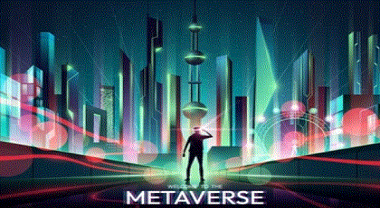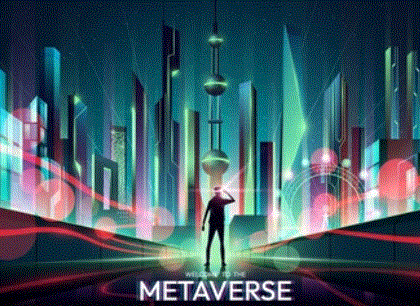The Legal Complexities Around Metaverse
Introduction
“The metaverse is here, and it’s not only transforming how we see the world but how we participate in it – from the factory floor to the meeting room” – Satya Nadella.
The world is witnessing multiple new inventions every passing minute and a boom in popularity of the Metaverse. The leaders of the tech world have claimed that metaverse is not merely the next invention or part of the future rather it is the future itself. Metaverse is a 3D world where multiple users can interact with each other using evolving technology that would enable the users to enjoy real time experience of the events and activities happening in the virtual world. Moreover, at the same time, it triggers a discussion about the possible legal framework that would govern the metaverse and the possible legal implications of this ungoverned and unregulated AI- powered world.
[Image Source : Shutterstock]
Many companies are collaborating to create an innovative and immersive metaverse experience and have somewhat succeeded in doing so however the legal aspects of the same are unaddressed, rather ignored. On fear to which, this paper talks about the possible IPR implications in Metaverse and in furtherance attempts to suggest possible methods for proper governance of actions taking place in the metaverse.
Overview
Metaverse is a virtual world that mirrors our own. One can interact with other and take up real world activities and even own things. All these can be done and controlled through a few touches sitting on sofas in the physical world. For some of the people it is the future of today’s internet but what operates in a more decentralized fashion as there are no existing laws governing the activities happening in metaverse and for those controlling and operating the tech world imagine it as a parallel plane of existence, a 3D virtual simulacrum of Earth but with many fictional elements. Metaverse was mentioned in a novel by Neil Stephenson in the book Snow Crash. It’s a famous novel in the world of technology and Geeks. There the writer mentioned that richer people tend to escape the real world and go into a virtual world. The Metaverse and its concepts date back to 1970, where the word “Metaverse” was mentioned only in novels and movies and back in those days one could only dream of such an AI-powered world. Today, Bitcoin has been legalized for payments in many countries, VR powered games are available at a click and tech-giants like Nvidia and Siemens have partnered to power the next technological revolution that would create a parallel world that would be fueled by Internet, AI, NFTs and Bitcoins.
Facebook recently changed its name to META and has proposed to invest roughly 10 billion dollars to develop the Metaverse. Other tech giants such as Google, Microsoft, and Nvidia are also investing in the Metaverse concept to create a virtual world. At present, many companies are implementing the concept at a micro level to study the pros and cons of the same. Remote realistic work experiences such as 3D meetings in which people interact with one another is one of the first concepts adopted by multiple companies.
The metaverse is no more a dream rather a possibility. These new technologies will lead to new behavioral changes and these new activities would power new markets that no one can predict at present.
IPR in Metaverse
The aim of IPR (Intellectual Property Rights) is to provide protection to the ideas, goods, and services, and the creator of these are protected from infringement of their rights. The Metaverse provides vast opportunities for brands to venture into creation of new technologies. Companies are working tirelessly to provide the best and most economical services and products to the users. An upsurge in production of new technology would provide multiple opportunities in the field of IPR, such as patents and copyrights over new technological inventions and concepts and other trademark rights of the companies looking to provide services in the virtual world. For proper governance and to achieve its said goals, IPR would play a key role. One needs to connect dots of IPR with the needs and challenges of the virtual world and a possible solution to this is by releasing motion/ audible trademarks etc. A major challenge would be the governance and ownership of trademarks in the virtual world as there would be different product lines and a variety of new goods and services and as new virtual platforms are created there will be new technologies up for patenting, some of them might resemble the existing inventions in the real world but might be an altogether new invention in the virtual world, this would make it difficult to transfer the existing patents to the virtual world and would further complicate the process of granting patents for inventions. Another question that stays unanswered is, how will the existing trademark rights be treated in the virtual world? The ownership would simply be transferred from the existing real world to the virtual world or the companies and individuals would need to register their trademarks again.
At presently there is a classification of trademarks that can be used in the Metaverse
• Class 9: – Section 9 refers to the virtual goods that can be downloaded from the internet.
• Class 35: – Section 35 signifies the virtual advertisements by the business and retail stores.
• Class 41: – Section 41 refers to the virtual education facilities provided to the students and the virtual entertainment.
IPR challenges in the Metaverse phase
Trademark rights in Metaverse
Trademark is a type of Intellectual property consisting of a unique logo, tagline that helps in distinguishing the good and services of one company from another. The metaverse and the functioning of the same raise a doubt about the legality of the existing trademarks in the physical world in the virtual world. In the case of E.S.S Entertainment 2000 Inc. V. Rockstar Videos, Inc, 2008 , the court decided that the use of the trademark logo of a club in a video game wouldn’t amount to trademark infringement. In another case of TATA Sons V. Green Peace Limited, 2011 , the court ruled in favor of the defendant who had used the trademark of the petitioner in a video game. With unpredictability, no binding rules and conflicting judgments one can only speculate how some issues would be addressed in future. For example, if a person from Australia does some activity that leads to trademark infringement of a company based in Sweden under which jurisdiction this issue would fall and application of “Long Arm Jurisdiction” principle propounded in Swami Ramdev V. Facebook, 2019 remains a question. In addition to the confusion about the ownership of trademarks in the physical and virtual world, the present system of laws has failed to acknowledged and provide basic legislations to uphold the justice of original trademark holders.
Patents within Metaverse
A patent is a type of Intellectual property that gives the owner a legal right to exclude others from using the invention without prior consent from the inventor. Several attempts have been made to patent the idea of metaverse itself however the same is not practically possible this several patents have been filed under various verticals. The present laws talk about the 3-step rule (Novelty, Inventiveness and Industrial Acceptability) that helps in deciding whether a patent should be granted or not. However, this might not be sufficient to regulate the grant of patents in Metaverse where new markets would come up with unique products and this 3-Step test might become redundant. Some more questions that remain to be answered is what about the patents created by the Avatars themselves within the metaverse and how will the authorities go about granting patents to those inventions that are a result of changes in the existing products in the real world but they might have greater application in the virtual world with those changes. At present many companies and game developers have been filing for patent rights as the gaming experience has evolved and has become online and socially interactive. In the recent case of World Inc V. Activision Blizzard, 2013 , the court said that the metaverse technology is fundamentally based on computer-software technology and the same has been challenged as non-patentable. Recently, Indian entrepreneur B.S Prakash was awarded the patent for the first ‘Digital Vaccine’, interestingly the same was tested by him a video game. This case also leaves one to ponder on how the authorities would regulate the intellectual property rights in the “virtual pharmaceutical industry”.
Copyrights in Metaverse
Copyright is another Intellectual Property right that helps one to protect their ideas and replication of the same without proper consent. The virtual world has distinct kinds/classes of inventions the copyright claims are also vastly different ranging to multiple categories. According to the Copyright Act, 1957 the author of the work would be the owner of the copyright. The major issue w.r.t copyrights is who would own the copyright of things created on an open metaverse platform, the real-world user through its user or owner of the metaverse platform. Another issue with Copyrights is the limit/boundary w.r.t to content exploitation. For example, a person applies/uses an idea of the real-world in the metaverse and the same violates the rights of a person/ organization that owned the copyright in the real world, how will the authorities tackle such issues. A similar instance took place when luxury brand Herm`es sued a person for selling identical products on the metaverse in the form of NFTs.
Conclusion
The Metaverse is certainly the future. Tech giants and governments around the world have invested around $100 Billion in development of the Metaverse world. Multiple companies have formed consortiums and associations to work together on this mammoth project that is the potential future. As the upcoming technologies evolve, new laws would be needed to uphold the rights of the creators and users. The shift into virtual reality would be gradual however the formation, application and understating of the legislations will take a lot more time. By studying the cases of E.S.S Entertainment 2000 Inc. V. Rockstar Videos, Inc, 2008 and TATA Sons V. Green Peace Limited where Trademark infringement in the virtual was not identified as illegal by the courts might call for a whole new set of legislations to govern the metaverse.
Similarly, the approach of the court in the case of World Inc V. Activision Blizzard, 2013 stirs up a discussion as to what all things would be termed as “Patentable” and “Non-Patentable” in the virtual world. As a suggestion, the present government and other regulatory bodies should form a separate forum/ organization including tech, cyber and IPR experts who would contemplate at the possible issues in metaverse and provide practical solutions for the same. With the interpretation of the above-mentioned core Metaverse would soon become a full-fledged reality and the legal aspects and lacunae of the same would be different from what it is now and the same needs to be addressed timely.
Author: Harsh Shekhar, 3rd Year, BBA-LLB Student at Bharati Vidyapeeth, New Law College, Pune, in case of any queries please contact/write back to us at support@ipandlegalfilings.com or IP & Legal Filing.




